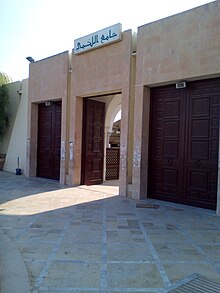Abu al-Hassan al-Lakhmi
Abu al Hassan Ali ibn Muhammad Al-Qayrawani Al-Lakhmi | |
|---|---|
 Entrance to the mosque and tomb complex of Imam Al-Lakhmi in Sfax, Tunisia. | |
| Title | AL Lakhmi |
| Personal | |
| Born | 1006 CE (390 AH) Kairouan, Zirid Dynasty |
| Died | 1085 CE (478 AH) Sfax, Zirid Dynasty |
| Religion | Islam |
| Era | Fatimid Caliphate |
| Region | Ifriqiya (modern day Tunisia) |
| Jurisprudence | Maliki |
| Creed | Sunni |
| Main interest(s) | Fiqh |
| Notable work(s) | at-Tabsira |
| Muslim leader | |
Influenced
| |
Abu al-Hassan Ali ibn Muhammad Al-Qayrawani Al-Rab'i[1] Al-Lakhmi (Arabic: أبو الحسن علي بن محمد القيرواني الربعي اللخمي), also known as Imam al-Lakhmi (c. 1006 – 1085 CE) (390 AH – 478 AH ), was a famous jurist in the Maliki school of Sunni Islamic Law. His nisba indicates that he is from the Arab tribes of Banu Lakhm.[2] He was one of the most important figures in the school and his opinions are still well known and respected to this day. Al-Lakhmi was one of four jurists whose positions were held as authoritative by Khalil ibn Ishaq in his Mukhtassar (one of the most important of the later texts in the relied upon positions of the school).
Biography
Al-Lakhmi was born in Qayrawan and spent the early part of his life there before moving to Sfax. Here he continued his education and then began teaching students in the mosque of the city. One of his students was al-Mazari (d. 536/1141), who refers to al-Lakhmi more frequently than any other teacher in his own works.[3] Al-Lakhmi died in Sfax in 478/1085.
Known works
Al-Lakhmi's juristic compendium al-Tabsirah[4] is an important text in the Maliki legal school. It is a commentary on one of the Maliki school's most famous works, al-Mudawwana, by Sahnun b. Sa'id (d. 240/854).
This book is a reference that takes up the great books that preceded it as al-Wadiha of Ibn Habib and which will then be taken up by the Malikite scholars later as Ibn Rushd or al-Khalil in his Mukhtasar.
In the book he discusses many questions in detail and develops opinions, relating these to teachings of other Maliki scholars.
References
- ^ Hakim, Besim Selim (2013-07-04). Arabic Islamic Cities Rev: Building and Planning Principles. Routledge. ISBN 978-1-136-14074-7.
- ^ Al Lakhmi, Ali ibn Muhammad. Najib, Ahmed Abdul Karim (ed.). "At-Tabsirah" (in Arabic). Ministry of Awqaf and Islamic Affairs - Qatar.
- ^ Mazari, Muhammad ibn Ali (2008). Sharh al-Talqin. Dar al-Gharb. pp. Vol. 2, p. 539.
- ^ "AT-TABSIRAH – AL-LAKHMI (408H) – 14 VOLUMES (FIQH MALIKI)".
- v
- t
- e
- Malik ibn Anas (founder of the school; 711–795)
- Ali ibn Ziyad (d. 799)
- Ibn Wahb (743–813)
- Ibn al-Qasim

- Asad ibn al-Furat (759–828)
- Yahya ibn Yahya al-Laythi (d. 848)
- Sahnun (d. 854/55)
- Ahmad ibn Abi Bakr al-Zuhri (767–856)
- Ibn 'Abd al-Hakam (801–871)
- Abu al-Arab (d. 945)
- Ibn Abi Zayd (922–996)
- Al-Baqillani (950–1013)
- Sidi Mahrez (951–1022)
- Qadi 'Abd al-Wahhab (973–1035)
- Abu Imran al-Fasi (d. 1039)
- Ibn 'Abd al-Barr (d. 1071)
- Al-Baji (1013–1081)
- Al-Lakhmi (1006–1085)
- Al-Lamti
- At-Turtushi (1059–1126)
- Al-Maziri (1061–1141)
- Ibn Barrajan (d. 1141)
- Abu Bakr ibn al-Arabi (1076–1148)
- Qadi Ayyad (1083–1149)
- Al-Suhayli (1114–1185)
- Averroes (1126–1198)
- Al-Tamimi (d. 1207/08)
- Al-Qattan (d. 1231)
- Al-Azafi (1162–1236)
- Ibn al-Hajib (d. 1249)
- Al-Qurtubi (1214–1273)
- Al-Qarafi (1228–1285)
- Ibn Ata Allah (1259–1310)
- Al-Zarwili (d. 1319)
- Ibn Rushayd (1259–1321)
- Ibn al-Haj (d. 1336)
- Ibn Juzayy (d. 1340)
- Khalil ibn-Ishaq (d. 1365)
- Ibn Marzuq (d. 1379)
- Ash-Shatibi (1320–1388)
- Ibn Farhun (d. 1397)
- Ibn 'Arafa (1316–1401)
- Ibn Khaldun (1332–1406)
- Al-Sakkak (d. 1415)
- Taqi al-Din Muhammad ibn Ahmad al-Fasi (1373–1429)
- Ibn Faïd (1394–1453)
- Abd al-Rahman al-Tha'alibi (1384–1479)
- Ibn al-Azraq (1427–1491)
- Ahmad Zarruq (1442–1493)
- Ibn Hilal al-Sijilmasi (d. 1497/98)
- Ali ibn Qasim al-Zaqqaq (d. 1506/07)
- Al-Wansharisi (d. 1508)
- Ibn Abi Jum'ah (d. 1511)
- Al-Miknasi (1437–1513)
- Al-Hattab (1497–1547)
- Al-Akhdari (1512–1575)
- Al-Mandjur (1520–1587)
- Al-Tamgruti (d. 1594/95)
- Ibn Ashir (1582–1631)
- Al-Laqani (d. 1631)
- Mayyara (1591–1662)
- Al-Dila'i (d. 1678)
- Al-Qadir al-Fasi (1599–1680)
- Al-Rahman al-Fasi (1631–1685)
- Az-Zurqani (1611–1688)
- Muhammad al-Zurqani (1645–1710)
- Ibn al-Tayyib (1698–1756)
- Al-Bannani (1727–1780)
- Ad-Dardir (1715–1786)
- M'Hamed Al-Azhari (d. 1793/94)
- Al-Tawudi ibn Suda (1700–1795)
- Al-Qasim al-Sijilmasi (d. 1800)
- Ahmad ibn 'Ajiba (1747–1809)
- Ad-Desouki (d. 1815)
- Usman dan Fodio (1754–1817)
- Al-Hajj al-Fasi (1760–1817)
- Abdullahi dan Fodio (1766–1829)
- Muhammad 'Ilish (1802–1882)
- Al Alawi (d. 1888)
- Salim al-Bishri (1832–1916)
- Ahmed Harrak Srifi (d. 1925)
- Ahmed Skirej (1878–1944)
- Muhammad al-'Arabi al-Tabbani (1897–1970)
- Mohamed Fadhel Ben Achour (1909–1970)
- Muhammad al-Tahir ibn Ashur (1879–1973)
- Muhammad ibn 'Alawi al-Maliki (1944–2004)
- Othman Battikh (1941–2022)
- Abdallah bin Bayyah (b. 1935)
- Ahmed el-Tayeb (b. 1946)
- Ahmad Karima (b. 1951)
- Hamza Yusuf (b. 1958)
- Muhammad al-Yaqoubi (b. 1963)
- Rashid Al Marikhi
- Hanafi
- Hanbali
- Shafi'i
- Zahiri
 | This biographical article about a person notable in connection with Islam is a stub. You can help Wikipedia by expanding it. |
- v
- t
- e












